Spotify has been one of the biggest music streaming platforms for some time now, allowing people to listen to their favorite music and podcasts on desktop and mobile devices. However, recently, the platform has been losing customers left and right due to its frequent price hikes.
More and more people are searching for alternatives, and the good news is that there has never been a better time than now to switch to a different option. The number of music streaming applications has been steadily increasing over the past few years, and these come with several features you may not find on Spotify. What's more, you also won't have to deal with rapidly increasing prices, as with Spotify.
To help you choose the best Spotify alternative, we've tested out various options and put together this guide listing the best ones. So, check them out now!
Apple Music
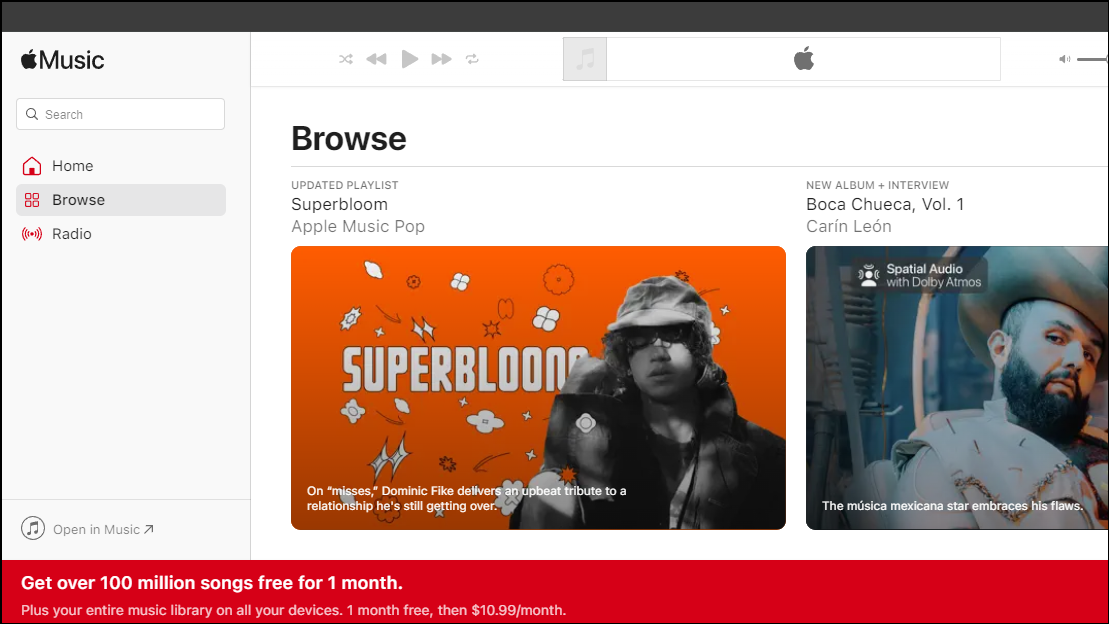
Apple Music
Ideal for those with access to the Apple ecosystem, this platform offers a huge music library, high-quality audio, and offline listening on Apple devices.
Pros: High-quality audio with 3D effects, huge music library, live radios, exclusive music launches, and more.
Cons: No free tier and works best on Apple devices
If you are an Apple user and have access to the Apple ecosystem, Apple Music might be the best Spotify alternative for you. With over 60 million paid subscribers, Apple Music offers high-quality audio, along with immersive sound and even head-tracking with Airpods. As for its music library, you get over 100 million music videos, songs, audiobooks, and podcasts and you can listen to them offline also on Apple devices.
Apple Music also lets you create your own personalized playlists like other music streaming platforms and offers a 3D audio effect, which enhances your music listening experience. Those with an Apple Watch can download and stream music on that device using Apple Music, and you can view the lyrics to the songs you play. Additionally, there are live radios for those who prefer that and you can upload your local music to the platform as well.
Another noteworthy thing about Apple Music is that it often serves as a platform for exclusive music launches, though its recommendation feature needs some work. Also, there is no free tier, so you will have to choose between the Apple Music Individual Plan costing $10.99 per month, the Family Plan costing $16.99 per month, and for students, the Student Plan, available for $5.99 per month. There is also a one-month free trial you can use to check out the platform.
Amazon Music
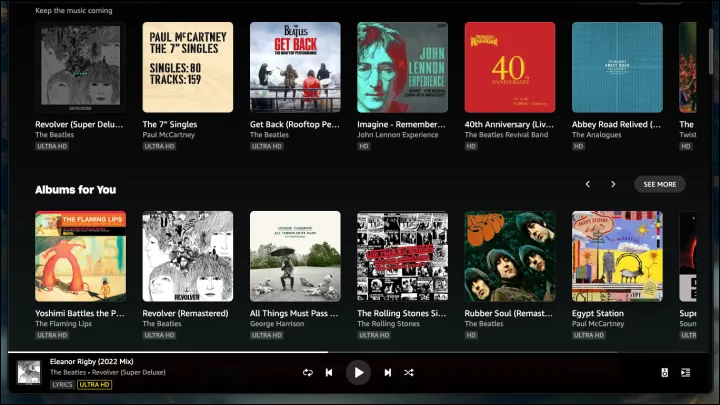
Amazon Music
A popular music streaming platform, Amazon Music offers multiple tiers, each offering different types of music listening experience.
Pros: Solid music recommendations, latest releases available, can choose from different pricing plans
Cons: Outdated UI
Amazon Music is another excellent alternative to Spotify with a huge collection of music, including trending as well as the latest songs, which you can listen to through your Prime subscription. It can also offer music recommendations based on your preferences and mood. Depending on which plan you choose, Amazon Music offers an ad-free music listening experience, music downloads, playback control with Alexa, and unlimited skips. However, the best thing that this platform offers is its podcast listening experience.
Coming to the pricing, you can choose between three tiers - Amazon Music Free, Amazon Music Prime, and Amazon Music Unlimited. The free version lets you listen to the radio and podcasts, but the listening experience is limited to SD and you cannot select specific albums and songs.
Amazon Music Prime is available to Prime members and provides an ad-free music listening experience and lets you select specific songs, though the playback is still SD and not HD. In comparison, Amazon Music Unlimited lets you play music in SD, HD, Ultra HD, and spatial audio and includes the Individual Plan costing $9.99 and the Family Plan costing $16.99.
Budget Plans costing $5.99 include the Single Device Plan, which lets you play music on Amazon's Fire or Echo devices, and the Student Plan which offers HD music. Thanks to the large number of plans, you can easily select one that best meets your needs, making Amazon Music a highly customizable option. While the UI may seem outdated, it still gets the job done, and the overall experience remains enjoyable.
Deezer
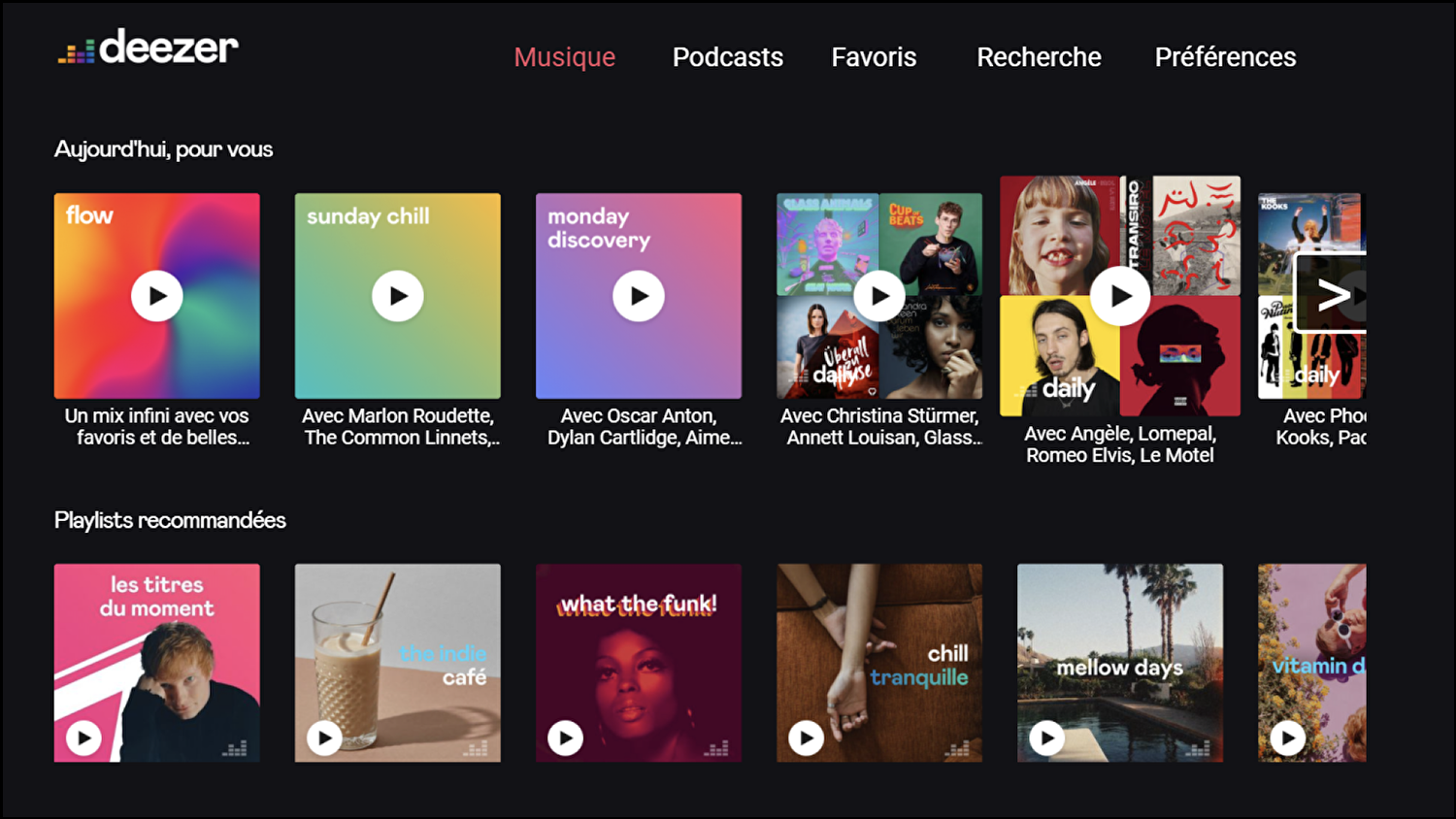
Deezer
Besides a huge library of songs and podcasts, Deezer offers features like AI-generated playlists and Hi-Fi audio playback.
Pros: Available for different devices, lets you download music, cross-platform collaborative playlists, song identification
Cons: Pricing is almost the same as Spotify
Next up we have Deezer, a music streaming platform that offers personalized recommendations and has a huge catalog of songs and albums. It has over 56 million licensed tracks and can also play music based on your preferences and mood, show song lyrics, and even play music offline. You can also create playlists and listen to radio like Spotify, and the platform has a web app as well as apps for different devices, including watches and phones.
Deezer's standout feature is Flow, which plays a selection of songs non-stop customized to your tastes using AI, which can help you find new songs and artists. Like other options, Deezer offers multiple pricing plans, with some even offering high-fidelity lossless audio playback. In addition, you can create collaborative playlists with others, even with people not using the platform.
Another fantastic feature Deezer has is SongCatcher, which lets you identify songs playing around you, much like Shazam. Deezer's free plan lets you listen to playlists and has ads, while the Premium Plan costing $11.99 per month offers hi-fi music playback, the ability to play specific songs, has no ads, and allows music downloads.
There is also the Duo plan, available for $15.99 that lets you enjoy the features of the Premium plan with two individual accounts and allows connecting up to five devices. The Family Plan is available for $19.99 per month, includes six individual Premium accounts, and can be used on up to 13 devices. Students can get a discount on the Premium plan for $5.99 per month. Overall, Deezer's pricing is the same as that of Spotify, so it is not the cheapest option.
Pandora

Pandora
One of the oldest music streaming platforms, Pandora offers music in the form of radio stations in a few select regions.
Pros: Allows free users to skip tracks, offers good music recommendations, has a powerful music search feature
Cons: Only available in the US, Australia, and New Zealand
Pandora is a very famous name in the music streaming industry, being one of the first platforms to offer playlists based on listeners' preferences. While originally limiting the number of hours free users could use the service, it now offers both free and paid music streaming options. Free users can even play specific tracks and albums by watching ads, which is something missing from free plans from other services.
Pandora has a huge music library, which is available in the form of radio stations, but keep in mind that the free plan limits the number of times you can skip songs. However, the biggest issue with the platform is that it is only available in a few regions, like the US, New Zealand, and Australia because of DMCA regulations.
That said, those who can access it can enjoy its vast music library, its powerful music search feature, and music recommendations based on its effective algorithm. As for the pricing plans, there is the Pandora Plus plan for $4.99 per month, which provides unlimited skips without ads and offers offline playing. Alternatively, you can go with the Pandora Premium Plan for $10.99, which comes with all Plus features, and also lets you create and share playlists.
Budget plans include the Family Plan, which costs $17.99 per month and includes six Premium accounts, Premium Student and Premium Military accounts costing $5.99 and $8.99 respectively, offering all Premium features. The Plus plan has a 30-day free trial while the Premium plan has a 60-day one.
Tidal
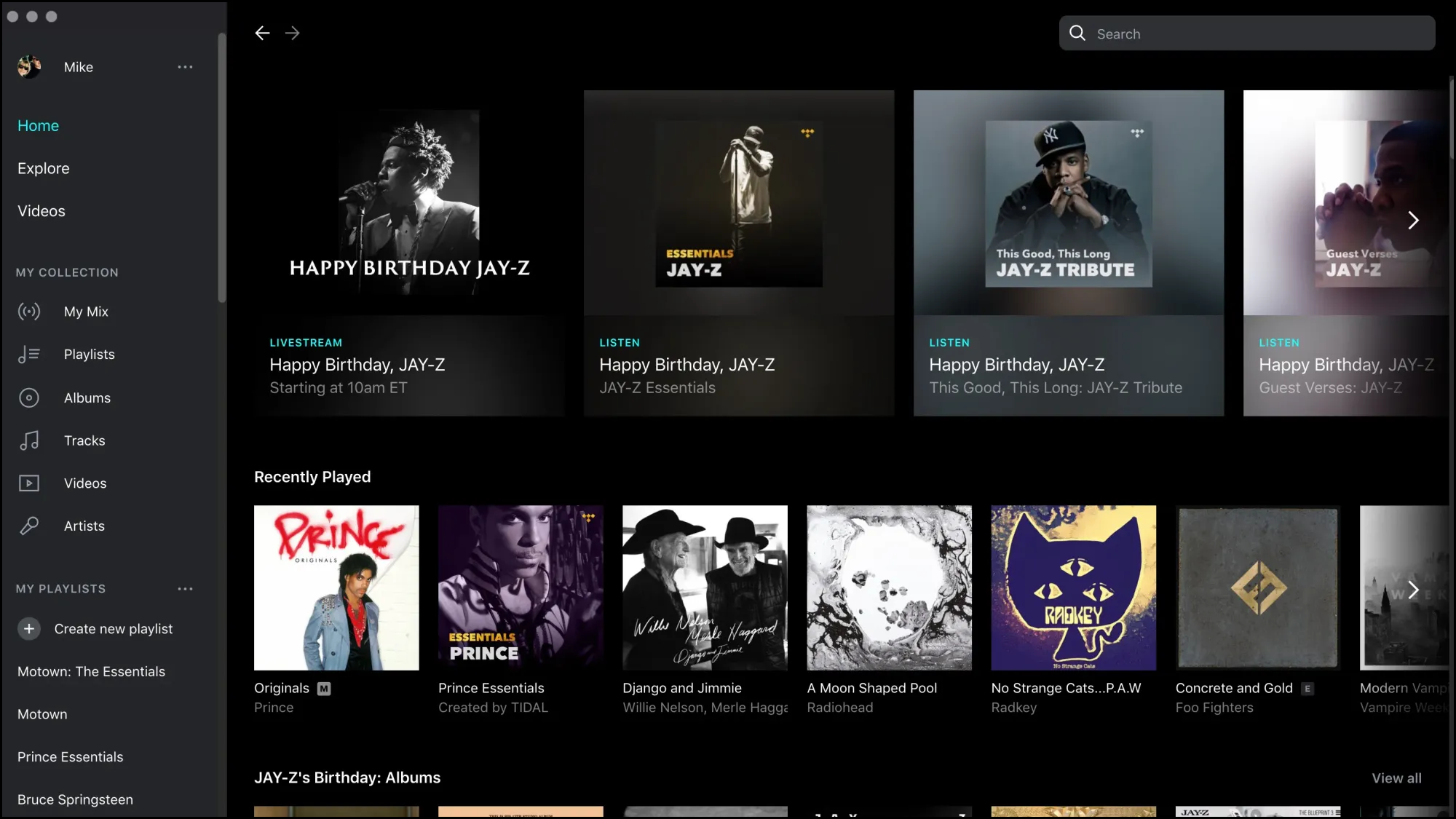
Tidal
Offers high-quality audio with support for technologies like Dolby Atmos and spatial audio, while also offering exclusive content.
Pros: Allows you to import playlists from Spotify, hosts exclusive events with artists, offers highest quality audio playback
Cons: Has issues with its CarPlay app
Tidal is often compared with Deezer, as they are quite similar, offering high-quality music streaming and exclusive content, including music and live radio. Tidal offers more than 100 million tracks and over 650,000 videos, in addition to three levels of audio quality, depending on your device and selected plan. It puts special emphasis on Hi-Fi audio quality and also lets you import playlists from other platforms.
Apart from that, Tidal provides access to exclusive events with artists and even opportunities to purchase show tickets before anyone else. The subscription costs $10.99 per month and there is a 30-day free trial you can use to check out the platform. If you want high-fidelity FLAC audio, there is the $25.99 plan per month and you get personalized music recommendations with both plans.
Tidal is also famous for offering better compensation to artists than other streaming platforms and supports Dolby Atmos 360 technology as well as spatial audio. The Individual Plan costs $10.99 and provides access to 110 million tracks in high-quality lossless audio, while the Family Plan offers the same for six accounts and costs $16.99 per month. There is also a Student Plan available for $4.99 per month and a 30-day free trial.
Tidal is among those options that do not have a free plan, which is one area where it loses out to Spotify. Also, its CarPlay app has some problems and needs improvement. Despite these issues, it is a decently good option for audiophiles looking for the highest-quality music streaming platform.
SoundCloud
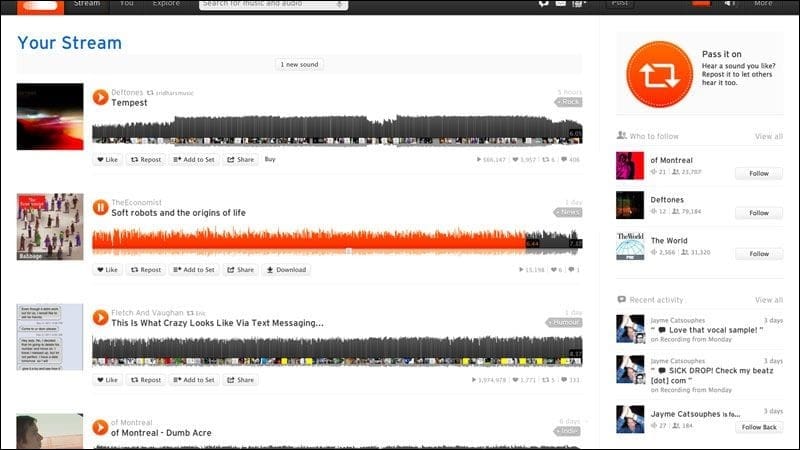
SoundCloud
SoundCloud is a great platform for discovering music by indie artists and even lets you upload your own tracks.
Pros: Offers a wide variety of music, frequently adds new features, lets you find music recently uploaded by artists
Cons: Limits the number of tracks free users can upload
One of the best places to stream independent music is SoundCloud, a platform that first became available back in 2007. However, it is not just a streaming platform, as you can create and upload your own tracks, create playlists, and add comments. SoundCloud is the most preferred choice for indie artists, so you may not be able to find many well-established artists on the platform.
However, it offers a greater variety of music to listen to than Spotify, with over 200 million tracks available. Additionally, SoundCloud keeps on adding new features that can further enhance your music listening experience. For instance, the recently added Upload feature lets you easily find music recently uploaded by indie artists in a playlist.
Other features common to music streaming platforms, like the ability to follow artists and skip tracks are all present here too. While the free version has ads, you can subscribe to the paid plans for more features. The SoundCloud Go Plan costs $4.99 and removes ads while also allowing offline listening, while the SoundCloud Go Plus plan costs $9.99 per month, and offers access to higher-quality audio.
This plan is also available for students for $4.99 per month and there is also a 30-day trial for SoundCloud Go Plus and a 7-day trial for SoundCloud Go plans respectively.
YouTube Music
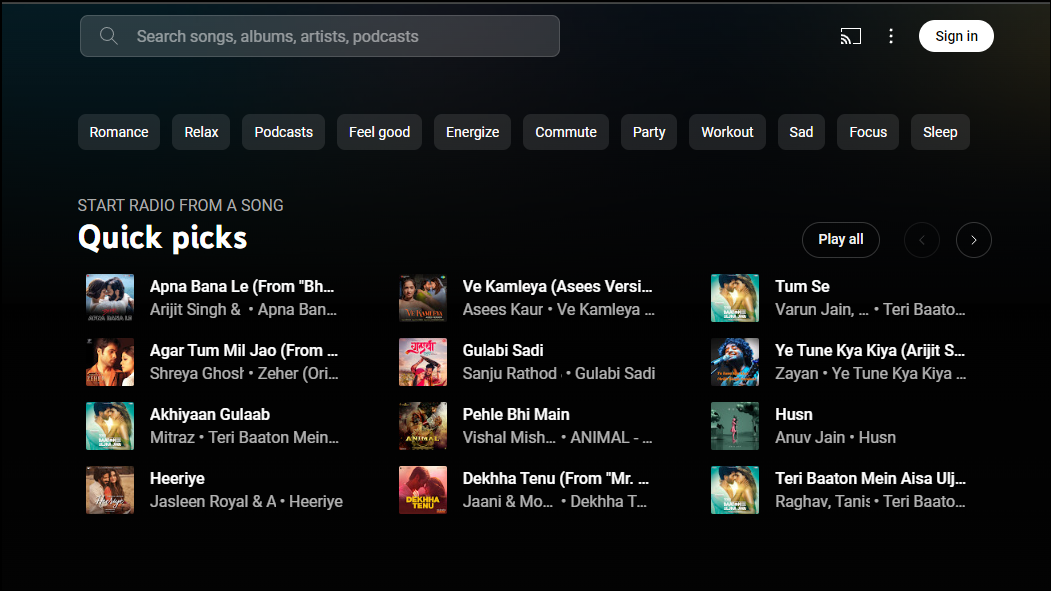
YouTube Music
YouTube Music relies on the YouTube search engine to bring you a huge library of music, including the most trending songs.
Pros: Easy to use, offers a huge library of music and videos, has playlists based on your mood, excellent music suggestions
Cons: Free version is not worth recommending
Google launched YouTube Music a few years ago to compete with the increasing number of music streaming services that have cropped up. Its biggest advantage over Spotify is that it offers countless videos in addition to music and relies on the powerful YouTube search engine. Also, since its interface is similar to YouTube's, navigating through it and using it is incredibly easy.
The main page shows playlists based on your mood, which can help you relax or focus as needed without needing to search for specific songs. Besides the huge number and variety of songs, YouTube Music provides access to the latest trending hits, and its song suggestions are much better than Spotify's.
If you choose to use YouTube Music for free, you can select individual songs and albums but with ads. Unfortunately, the music will stop if your screen goes dark or you switch to another app when using the platform on a mobile device. This is something that has kept a lot of people away from the platform.
To avoid this, you can opt for YouTube Music Premium, which costs $10.99 per month, and contains no ads while also allowing you to download music offline. The Family Plan is available for $16.99 and lets you add up to five members, while the Student Plan costs $5.49 per month and there is also a one-month free trial for this plan.
While the list of music streaming platforms is rapidly increasing, we've shared the seven best options you should consider if you want to switch from Spotify. All of these are available on multiple platforms and come with most features that Spotify offers, including some that it lacks.
These platforms also offer free trials or have a free version that can help you try out the service without paying a dime. However, for the best music listening experience, we recommend going with a paid plan once you have selected which one to go with.

